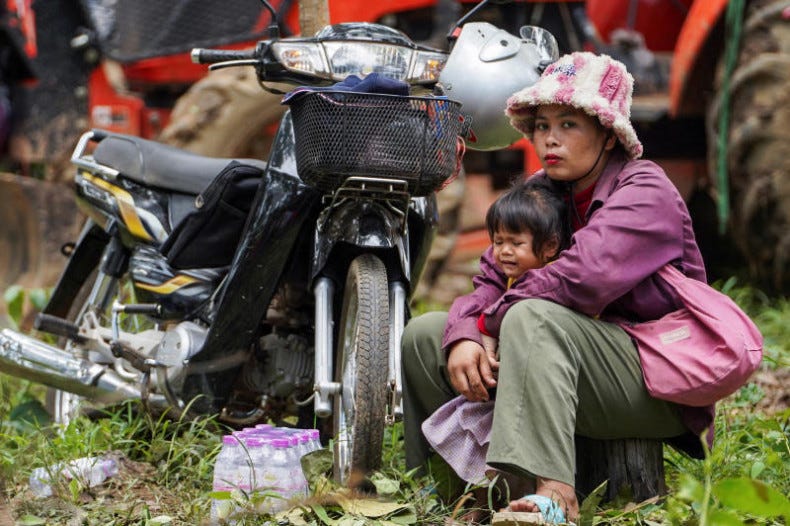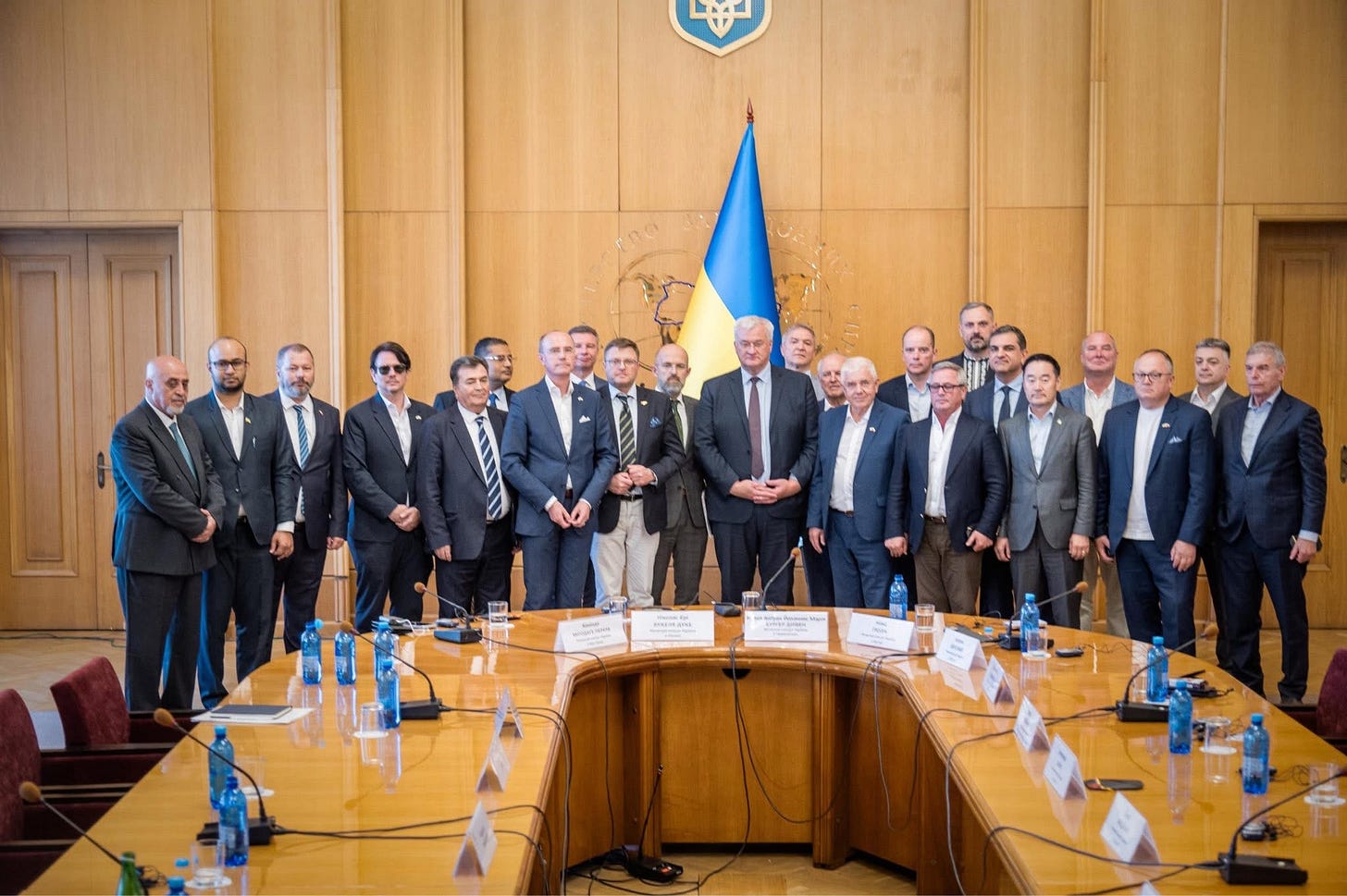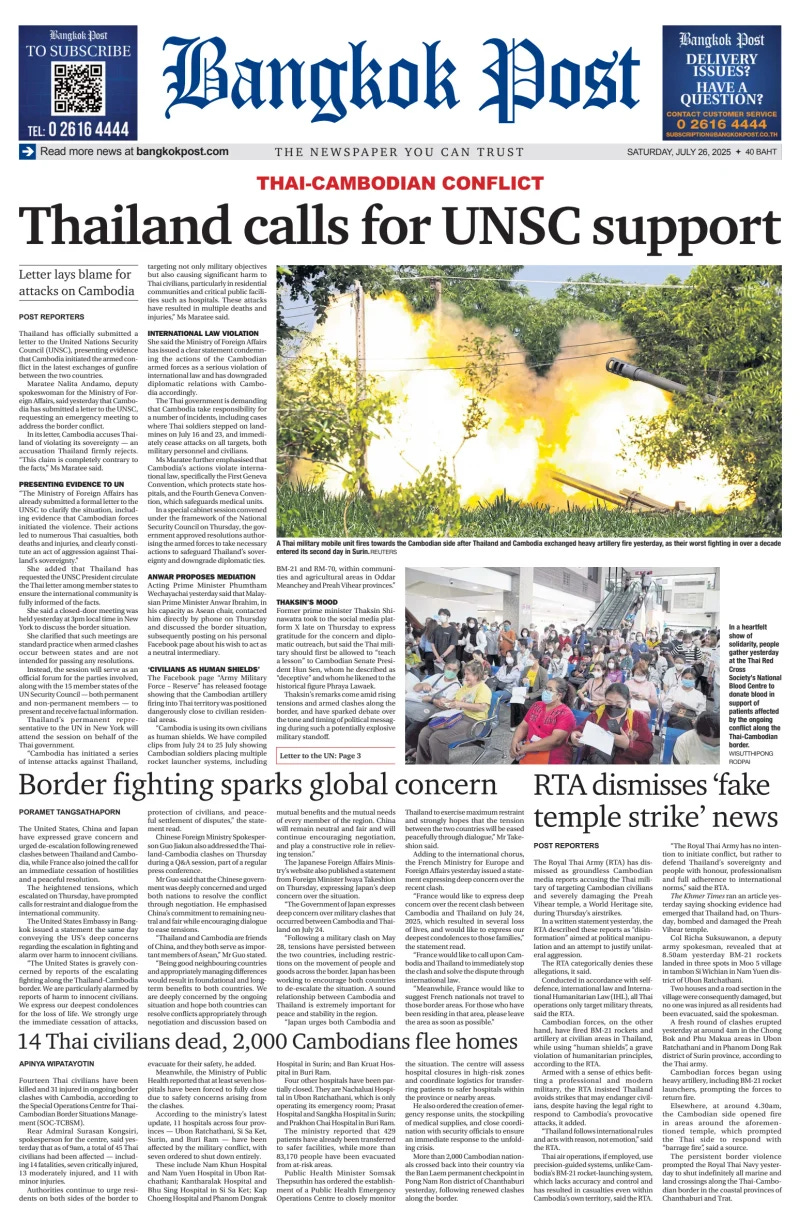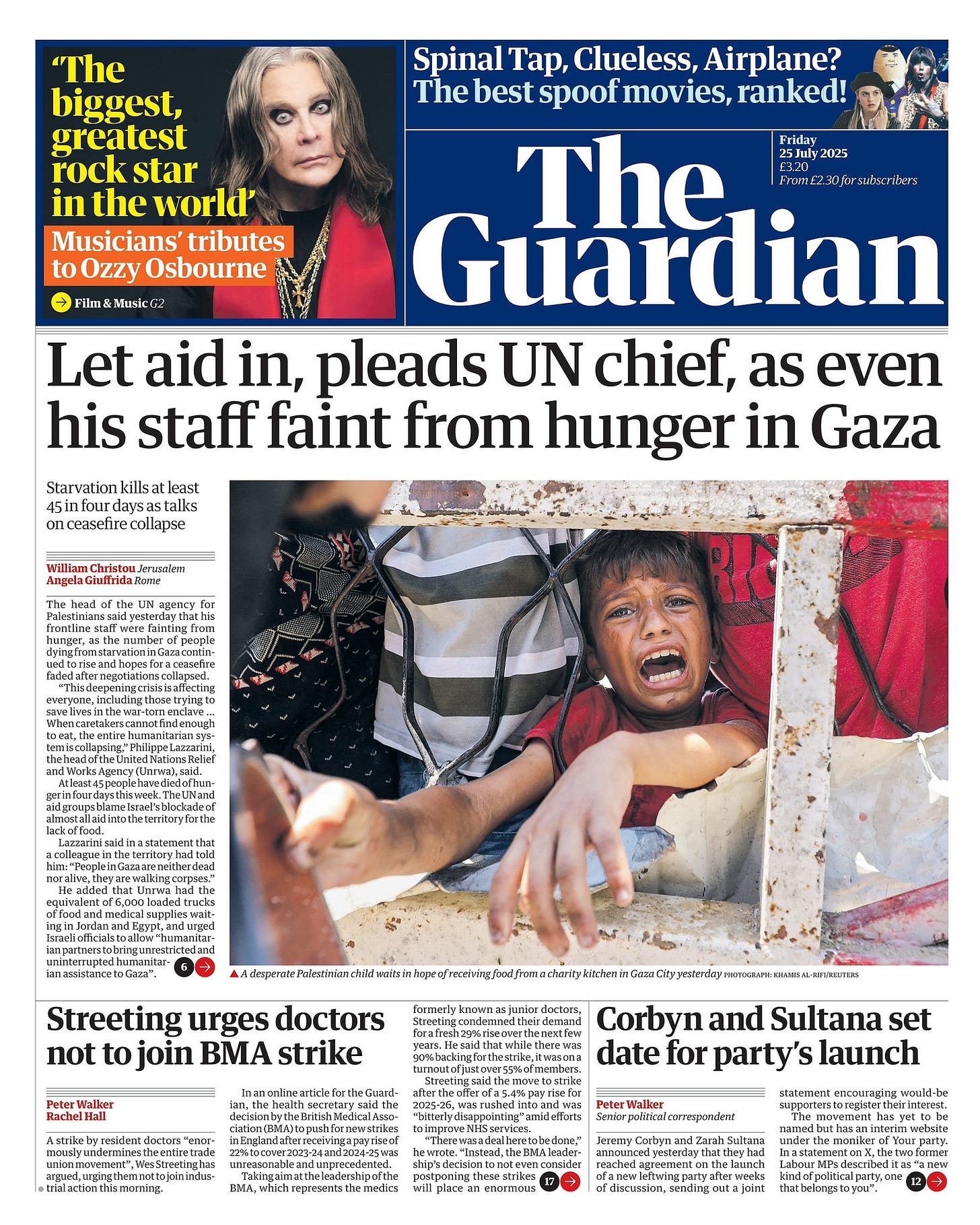🌏 Southeast Asia on the Brink: Border War Threatens Regional Stability
Thailand and Cambodia exchange deadly artillery fire as 130,000 flee — Malaysia, China, and the U.S. offer mediation amid fears of a wider conflict in ASEAN’s backyard

Thailand and Cambodia exchanged heavy artillery fire for a second day on Friday (Jul 25) as fighting intensified and spread, while Cambodia's leader said Thailand had agreed to a Malaysian ceasefire proposal but then backed down. At least 20 people have been killed and more than 130,000 people displaced in the worst fighting between the Southeast Asian neighbours in 13 years. Both sides have blamed each other for starting the conflict and on Friday ratcheted up the rhetoric. Thailand accused Cambodia of deliberately attacking civilians and Cambodia condemned Thailand for using cluster munitions, controversial and widely condemned. Thailand's acting prime minister, Phumtham Wechayachai, said Cambodia had attacked on multiple fronts. "The situation has intensified and could escalate into a state of war. At present, it's a confrontation involving heavy weapons," he told reporters. Cambodian Prime Minister Hun Manet said in a social media post that he had agreed to a ceasefire proposed by his Malaysian counterpart Anwar Ibrahim, chair of the ASEAN regional bloc, who had informed him that Phumtham had also agreed. "However, it is regrettable that just over an hour later, the Thai side informed that they had reversed their position," Hun Manet said. Thailand late on Friday said it agreed in principle with the idea of a ceasefire and would consider it, but that it must be based on "appropriate on-the-ground conditions…Throughout the day, Cambodian forces have continued their indiscriminate attacks," the Thai foreign ministry said in a post on X. "Cambodia’s actions demonstrate a lack of good faith and continue to place civilians in danger."
Commenting on the Thai-Cambodian conflict, seasoned Asia-watcher Shawn Crispin wrote for Asia Times that it will test ASEAN’s cohesion while sparking speculation about great power alignment and intervention. “Cambodia reportedly launched Chinese-made shells into Thai territory while Bangkok scrambled US-procured F-16 jets to retaliate. The bigger speculation, however, will swirl around the survival of Thailand’s already wobbly coalition government and potential for a new military coup now that chest-thumping and saber-rattling have graduated to artillery shelling and aerial bombardments.”
Malaysian Prime Minister Anwar said Friday that Thailand and Cambodia needed some time to pull back their troops from the border as part of a ceasefire, state news agency Bernama reported. “Yesterday, I had a phone conversation with the acting Prime Minister of Thailand and the Prime Minister of Cambodia, because of Malaysia’s position and their respect for us," said Anwar on Friday. He added that both countries needed “some time” to organise a troop withdrawal as part of a proposed ceasefire - TRT World
Wechayachai on Friday condemned Cambodia for committing serious war crimes by firing at Thai communities and hospitals and urged the international community to join in condemning these actions while martial law was expanded. In a statement read at Government House, Mr Phumtham said that Cambodia was attacking Thailand. He expressed disappointment that Cambodia opened fire despite Thailand’s patience and preference for peaceful solutions according to international laws and humanitarian principles. The Thai foreign affairs minister informed the United Nations secretary-general and the UN Security Council on Thursday about “the indiscriminate attacks, especially those on innocent people.” The minister called for the international community to condemn “this inhumane act.” - Bangkok Post
The ceasefire announcement was surprising as it came on the heels of comments by Thai foreign ministry spokesman that Bangkok preferred to handle the dispute itself through bilateral channels. He told CNA that the other side has to halt its aggression. “I think it’s premature to talk about any ceasefire.” Thai foreign ministry officials said Bangkok had received offers of mediation from the US, Malaysia and China
The United States lifted sanctions designations on several allies of Myanmar's ruling generals on Thursday, two weeks after the head of the ruling junta praised President Donald Trump and called for an easing of sanctions in a letter responding to a tariff warning. Human Rights Watch called the move "extremely worrying" and said it suggested a major shift was underway in U.S. policy towards Myanmar's military, which overthrew a democratically elected government in 2021 and has been implicated in crimes against humanity and genocide. The U.S. Treasury Department did not give a reason for the move, but Deputy Secretary Michael Faulkender said in a statement: "Anyone suggesting these sanctions were lifted for an ulterior motive is uninformed and peddling a conspiracy theory driven by hatred for President Trump." A notice from the U.S. Treasury Department said KT Services & Logistics and its founder, Jonathan Myo Kyaw Thaung; the MCM Group and its owner Aung Hlaing Oo; and Suntac Technologies and its owner Sit Taing Aung; and another individual, Tin Latt Min, were being removed from the U.S. sanctions list. KT Services & Logistics and Jonathan Myo Kyaw Thaung were added to the sanctions list in January 2022 under the Biden administration in a step timed to mark the first anniversary of the military seizure of power in Myanmarthat plunged the country into chaos - Reuters
Israel says it will allow foreign countries to airdrop aid into Gaza in the coming days, according to army radio and media reports Countries including the UK, US and Jordan dropped supplies into Gaza from military planes last year, but humanitarian organisations warned it wasn't enough to meet soaring needs Gaza's Hamas-run health ministry says nine people have died of malnutrition in the past 24 hours, bringing the total such deaths to 122. Humanitarian organisation Médecins Sans Frontières (MSF) says its teams are "witnessing catastrophic levels of malnutrition" among patients and staff in Gaza. Meanwhile UK PM Keir Starmer will speak to the German and French leaders today after Emmanuel Macron pledged to recognise the state of Palestine. Separately, a senior Hamas official denies to the BBC that Gaza ceasefire talks have collapsed, after the US and Israel withdrew their negotiating teams from Qatar - Washington had accused Hamas of not "acting in good faith"
The series of fires and explosions that have taken place across Iran since the Israel-Iran ceasefire have fueled public anxiety and suspicions among Iranian officials about Israeli sabotage. (ISW). Iranian Quds Force commander Ismail Qaani dismissed the recent explosions all across Iran: “These are not mysterious. They were all gas pipeline explosions caused by natural wear and tear. I confirmed this myself.”
U.S. military forces conducted a rare raid in northwestern Syria on Friday, killing a senior Islamic State leader and two other ISIS insurgents, the Pentagon’s Central Command said. In a statement, Central Command said that U.S. forces killed the leader, Dhiya’ Zawba Muslih al-Hardani, and his two adult sons in the Aleppo area. Central Command provided few details on the ground operation, but military counterterrorism raids — as opposed to airstrikes — have typically involved helicopter-borne Special Operations commandos, often supported by attack planes and drones. Such ground operations are riskier than drone strikes because they put troops in harm’s way. They often mean that the target is particularly important and likely to be near civilians to try to ward off an air attack. And the location of the raid may contain sensitive information — like computer hard drives, cellphones and other data — that could help counterterrorism forces plan future raids - NYT
Nigeria s facing “an unprecedented hunger crisis,” and the need for food is rising across west and central Africa while funds are shrinking, the U.N. food agency’s regional head said. Margot van der Velden said nearly 31 million people in Nigeria are facing acute food insecurity and need life-saving food — a number “equivalent to the entire population of Texas going hungry.” But the regional director of the World Food Program said that due to severe funding cuts starting in August, “we will face the heartbreaking reality of having to suspend humanitarian aid for the populations in areas devastated by conflict.” That means over 1.3 million people in Nigeria will lose access to food and nutritional support, 150 nutrition clinics in Borno state in the northeast where Islamic militants are active may close and 300,000 children will be at risk of severe malnutrition, and 700,000 displaced people “will be left with no means of survival,” she said. For years, the U.S. Agency for International Development had been the backbone of the humanitarian response in northeastern Nigeria, helping non-governmental organizations provide food, shelter and health care to millions of people The Trump administration has slashed foreign assistance and dismantled USAID, accusing the agency of waste and fraud and supporting a liberal agenda. Other Western donors also have slashed international aid spending. Van der Velden said WFP urgently needs $130 million to sustain its operations in Nigeria. But she stressed that the crisis is not just in Nigeria but across west and central Africa, where WFP also is facing critical funding shortfalls that are forcing the Rome-based agency to reduce or suspend operations in some of Africa’s “most fragile” countries.
Ukraine
🎥 Above: My on-the-ground report from Odesa’s beloved Pryvoz Market, filmed the morning after a violent night of Russian drone strikes.
While Ukrainian crews continue to impress with rapid cleanup efforts, I note in the video that some areas—like an Odesa neighbourhood heavily damaged this past winter—still bear deep scars, a stark reminder of the ongoing toll of war and the inefficiency of the southern port city’s administration.
Ukrainian President Volodymyr Zelenskyy has submitted a new draft bill to parliament to restore the independence of two anti-corruption agencies, after a controversial law curbing their autonomy sparked nationwide protests. The National Anti-Corruption Bureau of Ukraine (NABU) and the Specialized Anti-Corruption Prosecutor's Office (SAPO) had effectively lost the guarantees that enabled them to combat high-level corruption when Zelenskyy signed the law on July 22. Following two days of mass protests in Kyiv and a number of other major Ukrainian cities and criticism from Kyiv's European allies, Zelenskyy submittedthe new bill to parliament on July 24. The proposed legislation is set to restore all procedural powers and guarantees of independence, according to NABU. “NABU and SAPO participated in the preparation of the text and call on the Verkhovna Rada of Ukraine to adopt the president's initiative as a basis and in general as soon as possible," the agency said in a statement published in Telegram. “This will help prevent threats to criminal proceedings investigated by NABU and SAPO," it added. Ruslan Stefanchuk, speaker of Ukraine’s parliament, announced on Facebook that the document would be reviewed during the next plenary session. Prior to the announcement, Ukrainian opposition deputy Yaroslav Zheleznyak reported that the Verkhovna Rada had gone on "vacation" until the end of August. However, in his Facebook post, Stefanchuk added that the session would be held sooner than a month from now - RFE/RL
For the fourth day in a row, protests have been taking place in the capital and several other cities against the law adopted by the parliament and signed by the President on limiting the powers of anti-corruption bodies - NABU and SAPO. This is reported by Ukrinform correspondents. In Kyiv, hundreds of protesters have once again gathered on the square near the Ivan Franko Theater. Protests were also reported in Zaporizhzhia, Odesa and Lviv.
News Focus: Ukraine’s Foreign Ministry Meeting - A Clear Lack of Gender Diversity
Ukraine’s Minister of Foreign Affairs Andrij Sybiha this week chaired a gathering of honorary consuls from Ukraine and abroad. While the meeting was framed as an opportunity to strengthen international partnerships, a main takeaway was the glaring lack of gender representation. A ‘family photo’ Sybiha posted on Facebook (see below) from the event featured only men — a tone-deaf visual, at a time when gender equity remains a stated national priority. The meeting comes on the heels of President Zelensky’s recent appointment of 16 new ambassadors — just two of whom were women. This marks a significant reversal from the tenure of Sybiha’s former boss, Dmytro Kuleba, who notably increased the number of female ambassadors from 4 to 14 in just 18 months. Such regression undermines Ukraine’s democratic image abroad and sends the wrong message to its international partners and citizens alike.






